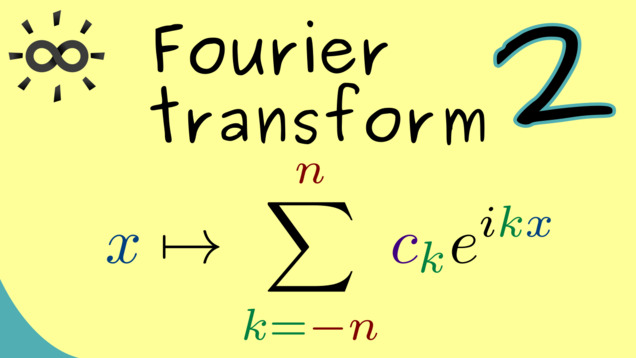
-
Title: Trigonometric Polynomials
-
Series: Fourier Transform
-
Chapter: Fourier Series
-
YouTube-Title: Fourier Transform 2 | Trigonometric Polynomials
-
Bright video: https://youtu.be/Us-m1-PQdAw
-
Dark video: https://youtu.be/_KKAT157e9s
-
Quiz: Test your knowledge
-
Dark-PDF: Download PDF version of the dark video
-
Print-PDF: Download printable PDF version
-
Thumbnail (bright): Download PNG
-
Thumbnail (dark): Download PNG
-
Subtitle on GitHub: ft02_sub_eng.srt missing
-
Timestamps (n/a)
-
Subtitle in English (n/a)
-
Quiz Content
Q1: Which of the following functions $f: \mathbb{R} \rightarrow \mathbb{R}$ is $1$-periodic?
A1: $f(x) = 5$.
A2: $f(x) = \sin(x)$
A3: $f(x) = \sin(\frac{x}{2 \pi})$
A4: $f(x) = \cos(\pi x)$
Q2: Which of the following functions $f: \mathbb{R} \rightarrow \mathbb{R}$ is not $2\pi$-periodic?
A1: $f(x) = \cos(\frac{1}{2} x)$
A2: $f(x) = \sin( 2 x)$
A3: $f(x) = \sin(3 x)$
A4: $f(x) = \cos(x)$
Q3: How can the trigonometric polynomial $f(x) = 2 \cos(x) + 4 \sin(2x)$ be written as a complex linear combination with exponential functions?
A1: $f(x) = e^{ix} + e^{-ix} + \frac{2}{i}( e^{i 2 x} - e^{-i 2 x}) $
A2: $f(x) = 3 e^{ix} + e^{-ix} + e^{i 2 x} - 3 e^{-i 2 x} $
A3: $f(x) = e^{ix} + \frac{2}{i} e^{i 2 x} $
A4: $f(x) = 2 e^{ix} + 2 e^{-ix} + \frac{4}{i}( e^{i 2 x} - e^{-i 2 x}) $
-
Last update: 2024-11